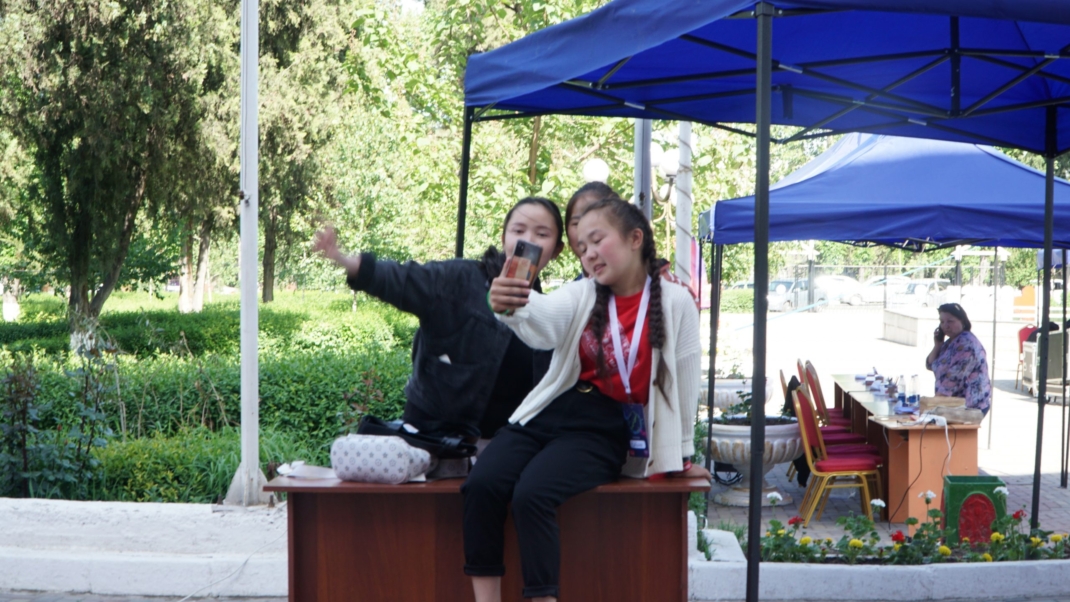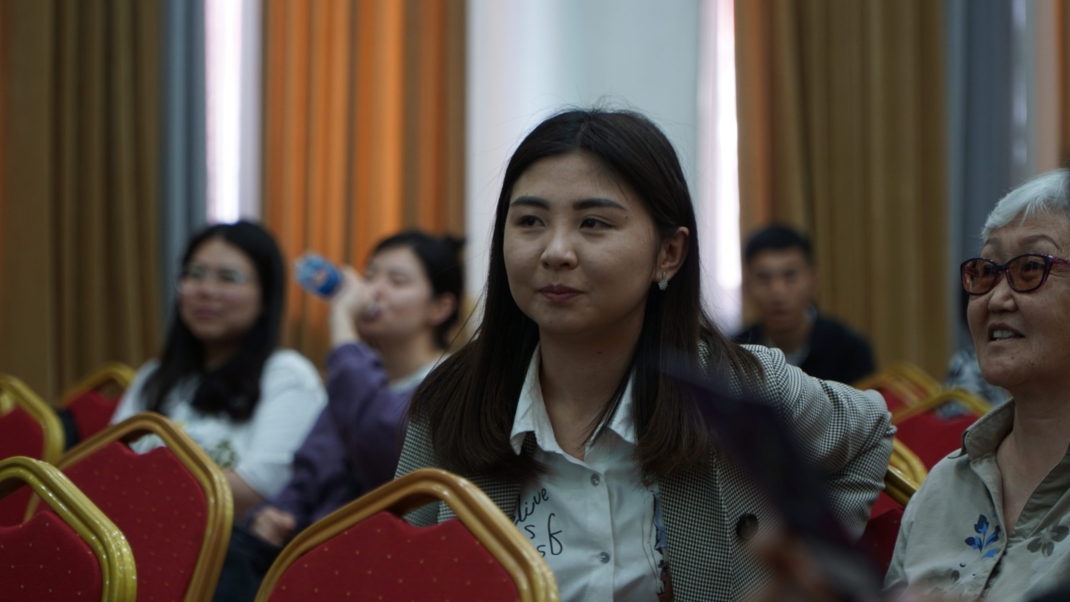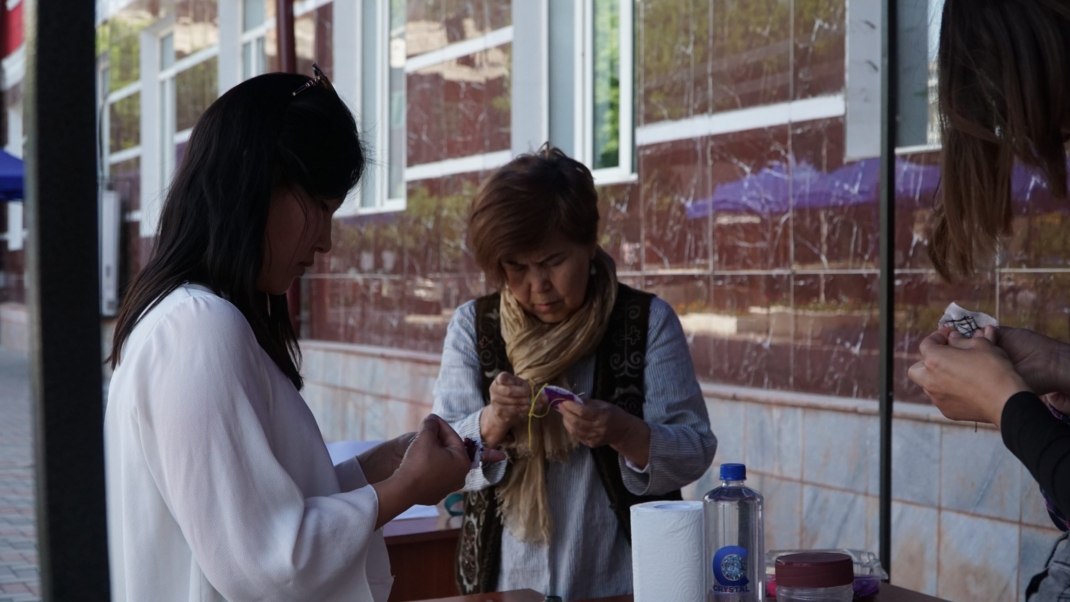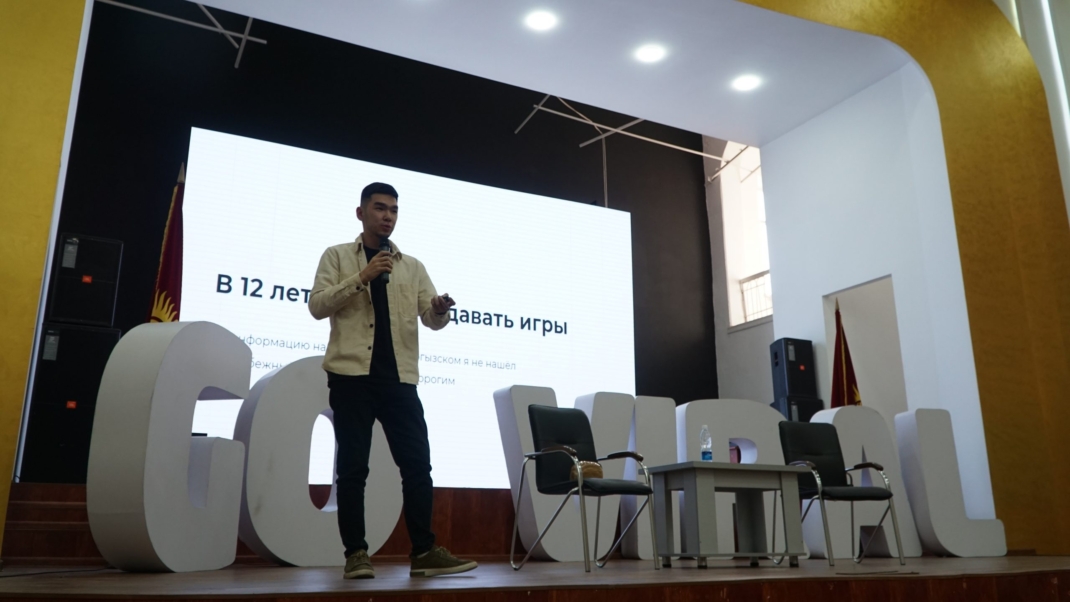Remote work, business innovations, psychology, viral content in Kyrgyz, use of social media for education and brand development. These and other topics were discussed on the second day of the festival.

Over 500 participants, as well as great specialists of media, business, culture and technology took part in workshops, panel discussions and master classes.
Go Viral Festival was first held in 2017 in Almaty. The event has grown from a three-day event to the regional community of representatives of media, business, culture and technology of five Central Asian states for five years. The project is funded by the U.S. Department of State with the support of the U.S. diplomatic missions in Central Asia. Since October 2021, the project is implemented by the Institute for War&Peace Reporting (IWPR) in Central Asia.
The second day was opened by Akmaral Satinbaeva, the head of local youth organisation, Youth of Osh. According to her, such events fill the town with interesting content and somehow contribute to holding young specialists in their motherland.
“They also learn about new professions, new spheres of activity. The festival is a great platform for networking – new useful acquaintances. Of course, participants get motivated by speakers’ stories, new projects and business ideas are born here. Despite only two days of the festival, it brings a lot of benefits,” Satinbaeva said.

Innovations and content matter in business
“Toiboss” company is the only digital enterprise not only in Kyrgyzstan, but also across Central Asia. According to Myrzabek Orumbaev, co-founder of the company, innovative solutions in business not only contribute to development, but also help maintain their key value – openness in everything.
Participants asked many questions to the speaker. They were interested in secrets of doing business, skills of entrepreneurs, the history of the company, and also asked for advices from the creator.
“Use your time efficiently. For example, if you study now in the university, don’t get distracted and study well. Looking back, I regret that I wasted my time. Pay more attention to education, your interests. There are so many opportunities for your professional development now,” Orumbaev said.
The audience wondered what books one of the prominent entrepreneurs of Kyrgyzstan reads.
“I did not read any special literature. I’ve read books by Chingiz Aitmatov. I didn’t take part in business workshops, I didn’t even have a business plan. It could be the right decision because I would have refused from business if I heard about risks and obstacles,” the speaker said.
The session of another speaker from business sector, Synysh Kekeev, was held in a very emotional atmosphere. The success story of an ordinary boy from the village, who just recently herded sheep, was the migrant worker, inspired the participants.

Synysh Kekeev is a chef, blogger, founder of Kekeev BBQ&Grill restaurant. He told how to use content and social media to promote one’s business. Without special education, yet with practical experience, and by creating viral content, Kekeev managed to top the list of restaurant businesses in a short time. According to him, there is no need in waiting for motivation and someone’s advices. It’s only education and action that will open doors to new opportunities. Of course, new possibilities, namely brand promotion via social media, will be useful.
“Back in 2016, I had my YouTube channel. I don’t consider myself a blogger. I just use blogging to sell my products. Many people ask me in comments why I speak Russian. I own a business in Bishkek, where representatives of different nations live, and I think it explains it all. So, I try to use all opportunities to develop my business,” Kekeev said.
Kyrgyz language – a key to wide opportunities
Some sessions on media discussed the role of Kyrgyz language in digital world and education. Blogger Barchynai Omarbek kyzy, known in the country as English Apake, noted that Russian is not needed as a mediator to learn English. Many teachers came to listen to her, who think it is very important to spread methods of learning English via Kyrgyz.
Many participants wanted to start a blog about the language like Barchynai. They were interested in technical moments, as well as the content. According to the speaker, every blogger must have their own peculiarity. Content should contain open questions or elements that make users give comments. And the most important thing is a discipline and consistency, one cannot upload a video and disappear for several days because this way algorithms would not work in favour of the blogger. There should be a precise content plan for at least 15 days.

One of participants, Tynchtykbek Bektashtegin, noted that Barchynai dispelled stereotypes about Kyrgyz language, TikTok and gender issues by her example.
“First, this is the colonial concept, when everyone thought that English cannot be learned without Russian. But Barchynai teaches English via Kyrgyz very well. Second, women have barriers in their self-realisation in terms of family and mindset in southern regions. But our speaker showed that every person can look for opportunities. And finally, while some urge to shut down TikTok, others use it for learning,” the participant said.
Another speaker of the festival, Erkaiym Alieva, told about how to create viral content in Kyrgyz. Erkaiym, is the author of media project “Suilo! Tartynba!” (Speak! Don’t be shy!), which popularised the Kyrgyz language and motivates the young people to speak their mother tongue. According to her, there is a misconception in the society that you won’t get far with the Kyrgyz language.
“There is not enough content in Kyrgyz on the internet. But creating something in this language gives so much joy. I urge you all to make quality materials in Kyrgyz. Famous bloggers chasing better reach rate prefer Russian language, but they could run their blogs in both languages, while giving priority to the Kyrgyz,” Erkaiym said.
She also added that there are no definite formulas for creating viral content in Kyrgyz. She just keeps it simple, natural and gentle in both visualisation and content. It took Erkaiym two years to create “Suilo! Tartynba!”. According to her, time is the key resource in implementing the idea.
General Manager of ManchoDevs, Argen Darmanov, focused on language issues in IT. His key message was that not speaking Russian or English is not an obstacle to becoming a programmer.
The speaker also told much about unfair conditions in education, work or public services. However, the young people should not sit passively referring to some language or financial hindrances. Today, educational online resources are available to everyone.

Remote work: a dream can come true
Kairat Kuvanychbekov lives in Kyrgyzstan, but works for Europe in the field of staff recruitment, employer’s branding, and project management in various sectors and organisations, including start-ups, corporations and NGOs.
The speaker focused on benefits of remote work and also emphasised frequent mistakes made in CVs.
“There are rules to write a CV. For example, if you don’t apply to the vacancy of a model, your photo will be unnecessary. You should not add your personal traits, as they cannot be proved. This is important because of strong competition. According to studies, 74 per cent of directors were convinced that their employees can work effectively even remotely after the pandemic,” he said.
The advantages of remote work are the decrease of environmental damage; people get happier by such conditions, which was proven by surveys; saving of time, the key resource. Among disadvantages, the speaker noted time lag and related problems with communication, because when it is morning in your country, it may be night in your employer’s country.
There were many participants who wanted to work for such countries as Portugal, Spain, Germany and U.S. while staying at home. Kuvanychbekov told about the conditions and laws of those countries.

Ainura Sagyn told about the most interesting trends and start-ups in digital clothing design as well as career in Web 3.0. She is the co-founder of Tazar platform, works in IT, teaches Kyrgyzstan women to fundamentals of programming. While some part of the audience heard about digital clothing designers who earn much money for the first time, another part of the audience discussed this topic on the same page with the speaker.
Besides, participants of the festival together with Lada Khasanova, founder of Osh Travel, were seeking ways of development of Osh as a travel destination, and were discussing the art of watching a movie with Sultan Usuvaliev. And finally, they were talking about the role of photo journalism in the contemporary world with photo correspondent Guliza Urustambek kyzy.
The interactive session held by Azat Muradilov showed that young people, unlike the older generation, take it normal to work with their problems together with a psychologist. The speaker told about personal boundaries, why you should never compare yourself with others, why you should never get involved in other people’s lives without asking. He discussed various psychological conditions and their causes with other participants.
After such intense sessions, the festival was closed in a festive atmosphere. The most active participants received gifts. And singer Aiym Aiylchieva performed at the last day.
Two days of the festival covered over 1200 participants. It’s not only this figure, but also the feedback of young people, their glowing eyes, their seeking themselves via the speakers’ experiences make us claim that the goals of this fantastic events were achieved.
According to the ambassador of Go Viral in Kyrgyzstan, Nazik Mamasadykova, the selection of speakers was great, each of them was listened to with great interest, which means they were expected. And organisers have already drawn interim conclusions.
“We have noticed that not only popular topics get viral. For example, we have talked about cinema and the session was full of participants, who were excited by the speaker and did not want him to leave. It was a kind of a red flag for us that showed that we should promote not only IT-related topics. But we must raise the points, which are not even discussed here,” she said.
The Go Viral festival will soon be welcomed in other Central Asian countries.



